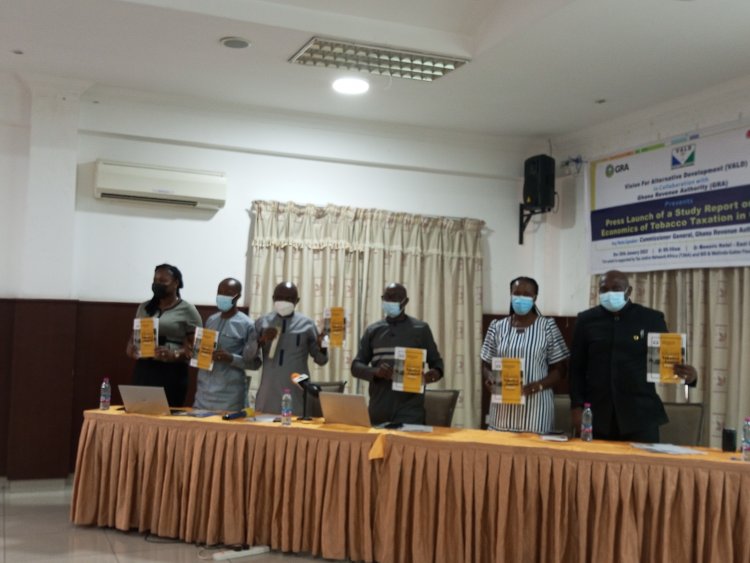In the report, Dr. Boachie indicated that the low cost of tobacco products is one of the main contributors to the upsurge in smoking among poor and rural dwellers.
He explained that selling a single stick of a cigarette instead of the box is encouraging young people and low-income earners to smoke.
According to him, whenever the price of tobacco products drops, there is a surge in its usage.
He, therefore, called for measures that would cause a sudden increase in tobacco products price.
Dr. Boachie proposed that not in the distant future, employment opportunities would be afforded first to none smokers.
The Executive Director of Programmes at VALD, Mr. Labram Musah added that some of the tobacco products on the market were smuggled into the country since our borders are porous.
He said the health effects and the cost to families are increasingly becoming worrying.
Mr. Labram used the opportunity to call on the government to adjust the tax on tobacco products to discourage smoking as well as clamp down the illicit tobacco products traders.
He called on stakeholders to rally support for tobacco control initiatives to reduce the crime rate in the tobacco trade and increase revenue for health and development.
That would help in reducing tobacco-related diseases and deaths.
Mr. Musah said the reason for the illicit trade protocol was clear that; “Recognising the enormity of illicit trade in tobacco products, the international community came together to draw up the protocol to eliminate illicit trade in tobacco products as well as provide guidance on the development of comprehensive strategies to address the problem.”
“Currently many countries in the African region had started requiring a picture health warning on tobacco products and we are happy to also note Ghana is among those countries requiring pictures on their pack. Not forgetting the tax stamps being implemented by the Ghana Revenue Authority,” he stated.
Mr. Musah said it was one excellent effort to control illicit trade, that had exposed the weaknesses at the country’s borders, adding that: “We hope that there will be a lot more consultation on the way forward in regards shisha in Ghana.”
He recommended to the Ministry of Health and the FDA) to resuscitate the Tobacco Control Inter-Agency Coordinating Committee (TCIACC) to help reduce the impact of tobacco in Ghana from all aspects.
“Imagine a lethal and deadly product with legitimacy to kill, now being adulterated/polluted – your guess is as good as mine …more deaths and disability, so illicit tobacco must be dealt with head-on,” he said.
Madam Marvis Danso from the Tobacco and Substances Abuse Department of the FDA outlined the health effects of smoking tobacco products and stated that as a country, Ghana had made significant strides in tobacco control through the various smoke-free policies outlined in Part Six of the Public Health Act 2012, (ACT 851).
“However, much effort is continually required in counteracting the infiltration of illicit tobacco in Ghana and success can only be attained with the concerted efforts of the developmental partners, CSOs, and stakeholders,” she said.
Coming from the office of the FDA as a regulator, she pointed out the FDA was represented at all border posts of the country to intercept and seize all illicit tobacco products intended for the Ghanaian market.
According to him, the Authority also oversees the registration of tobacco companies, tobacco imports, sales, and supply thorough inspections and other monitoring activities. Various requirements have also been set to enhance the easy identification of licit tobacco products on the market,” she said.
“These are all measures adopted to control the infiltration of our market with illicit tobacco products. For example, tobacco product labeling intended for the Ghanaian market should include, ‘For Sale in Ghana only’, emission statements, and pictorial health warnings validated for use in Ghana.
Although all these measures are in place to curb illicit trade, there have been setbacks in the control of the tobacco product supply chain; most especially in the three northern regions where there have been records of tobacco product smuggling, she stated.
Madam Danso expressed the hope that the implementation of the report would help address some of the challenges and advance the successes of the country in the fight against tobacco use.
She commended the VALD for sponsoring the report and called on VALD the WHO and other stakeholders to continue support to eliminate illicit trade in tobacco products.


 Freeman Koryekpor Awlesu Greater
Freeman Koryekpor Awlesu Greater 



































